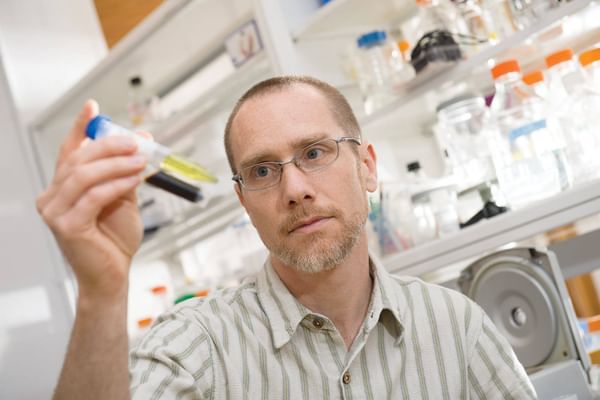- Undergraduate
Bachelor's Degrees
Bachelor of ArtsBachelor of EngineeringDual-Degree ProgramUndergraduate AdmissionsUndergraduate Experience
- Graduate
Graduate Experience
- Research
- Entrepreneurship
- Community
- About
-
Search

The Griswold Research Group is developing high-throughput screens for evolutionary protein engineering, new strategies for protein deimmunization, enhanced protein expression systems, and powerful antibacterial agents to treat drug-resistant infections. (Photo by John Sherman)
Research Interests
Protein engineering; directed evolution; biotherapeutics; applied biocatalysis; high throughput screening
Education
- BS, Chemistry, Southwest Texas State University 1995
- PhD, Chemistry, University of Texas at Austin 2005
Awards
- Wallace H. Coulter Foundation Early Career Translational Research Award in Biomedical Engineering (2008)
- NIH Biotechnology Training Grant (2000-2003)
- Royston M. Roberts - Regents Fellowship, University of Texas (1999)
- DOW Chemical Foundation Scholar, Texas State University (1991-1995)
- Presidential Upper Division Scholar, Texas State University (1994-1995)
- ACS Polymer Education Committee Award for Organic Chemistry (1993)
Professional Activities
- Senior Fellow, NAI
- Member, AIChE
- Member, ACS
- Member, SIM
- Member, ASEE
Startups
Stealth Biologics
Co-Founder and CEO
Co-Founder and CEO
Research Projects
-
Protein engineering tools in immunology
Protein engineering tools in immunology
Protein engineering tools in immunology can be used as an unbiased and systematic means of identifying new targets, generating diagnostic and therapeutic reagents, and characterizing the basic biology of infectious disease.
-
Cellular engineering of protein expression hosts
Cellular engineering of protein expression hosts
Cellular engineering of protein expression hosts provides the ability to modify proteins in a site specific and controlled fashion—something increasingly important for the development of therapeutic proteins. We are developing methods by which cells are genetically engineered to incorporate sugars on a recombinant protein in a site-specific sequence dependent manner. Once a sugar is positioned on a given protein, conventional chemical modification such as PEGlylation can be used to further modify the protein and improve its therapeutic properties.
-
Immunogenicity prediction
Immunogenicity prediction
Immunogenicity prediction is an important means to control the safety of protein drugs, which can be recognized by the patient's immune system as foreign, inducing an adaptive immune response that can cause significant toxicity. We are developing approaches in which the immunogenicity of proteins can be assessed in vitro using protein engineering tools.
-
Enzyme therapeutics
Enzyme therapeutics
Enzyme therapeutics are a potential means of addressing the emerging health care crisis resulting from drug resistant microbial pathogens. Efforts are focused on the redesign of antimicrobial proteins for enhanced bactericidal activity towards various clinically relevant targets. One facet of this work relates to complications associated with the genetic disease cystic fibrosis, and is being investigated in conjunction with the Cystic Fibrosis Foundation Research Development Program at The Geisel School of Medicine at Dartmouth.
Selected Publications
- Scanlon, T.C., Dostal, S.M., Griswold, K.E. A High Throughput Screen for Antibiotic Drug Discovery. Biotechnology & Bioengineering (2013), [Epub ahead of print]; PMID: 23955804
- Teneback, C.C., Scanlon, T.C., Wargo, M.J., Bement, J., Griswold, K.E., Leclair, L.W. Bioengineered lysozyme reduces bacterial burden and inflammation in a murine model of mucoid Pseudomonas aeruginosa lung infection. Antimicrobial Agents and Chemotherapy (2013), 57(11), pp. 5559–5564
- Lamppa, J.W., Tanyos, S.A., Griswold, K.E. Engineering Escherichia coli for Soluble Expression and Single Step Purification of Active Human Lysozyme. Journal of Biotechnology (2013), 164, pp. 1-8
- Choi Y., Griswold K.E., Bailey-Kellogg C. Structure-based Redesign of Proteins for Minimal T cell Epitope Content. Journal of Computational Chemistry (2013), 34(10), pp. 879-891
- Lamppa, J.W., Griswold, K.E. Alginate Lyase Exhibits Catalysis-Independent Biofilm Dispersion and Antibiotic Synergy. Antimicrobial Agents and Chemotherapy (2013), 57(1), pp. 137-145
- Osipovitch, D.C., Parker, A.S., Makokha, C.D., Desrosiers, J., Kett, W.C., Moise, L., Bailey-Kellogg, C., Griswold, K.E. Design and Analysis of Immune-Evading Enzymes for ADEPT Therapy. Protein Engineering, Design & Selection (2012), 25(10), pp. 613-624
Patents
Videos
Therapeutic Protein Research
Seminar: Molecular Engineering of WMD (Weapons of Microbial Destruction)
B&B: A high-throughput screen for antibiotic drug discovery
Seminar: Breaking the Pattern—Building Better Biotherapies
News

In the News
AtomsTalk
A New Anti-Bacterial Agent Engineered To Treat Drug-Resistant Bacterial Infections
Sep 03, 2020
A New Anti-Bacterial Agent Engineered To Treat Drug-Resistant Bacterial Infections
Sep 03, 2020
Concord Monitor
As Antibiotic Resistance Builds, Dartmouth Research Works On an Alternative
Mar 03, 2020
As Antibiotic Resistance Builds, Dartmouth Research Works On an Alternative
Mar 03, 2020










